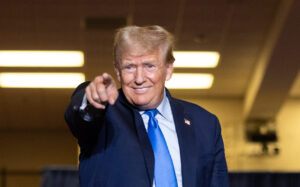Europe should not be insouciant about the prospect of a second Trump term. As many have pointed out, he would be more radical than the first time round. Everything that has happened since 2020 will have confirmed Trump’s instinct that disregarding constitutional convention is a good strategy, while his victory would also probably mean the end of US support for Ukraine — and possibly the end of Nato. It would certainly mean a period of slash-and-burn economics that would, among other things, undermine any attempt to stop climate change.
There might, though, be some ways in which a Trump comeback would be salutary for Europe — and, especially, for the United Kingdom.
Our relationship with the United States has, in the last few decades, become an unhealthy one. We are like adult children who live with their parents, sulking and complaining but assuming that someone else will do the laundry. If Trump wins it will feel as if Dad has had a sex change and Mum has shacked up with a member of the Hell’s Angels. Perhaps we will finally decide it is time to get a flat of our own.
After all, it is high time to remind ourselves that American hegemony is a recent phenomenon. The United States has been the richest country in the world since the late 19th century, but at first its wealth had little effect on the politics and society of Europe, except in so far as the daughters of American tycoons brought generous dowries and a healthy dose of red blood into a few declining ducal families. The United States fought briefly in the First World War but retreated into isolationism afterwards. And though the Second World War turned American into a global power, it was not obvious even in 1945 that this new role would be sustained. At first, American military commitments were wound down and there were those — especially the southern Dixiecrats — who would have liked to withdraw from world affairs again. What prevented it was the Cold War.
This period, in which America’s special relation with Western Europe was established was a peculiar one. First, the United States had a significant economic advantage. It had boomed during the war while many European countries had been destroyed: these are the conditions that gave us the Marshall Plan. Second, the United States faced an exceptional political threat. The Soviet Union was not just another great power; it was a state with ambitions to exercise influence in every corner of the globe, and one that attracted idealistic loyalty from people around the world (even if its own leaders were cynical). And so, Nato was born.
Conditions are changed now and the phrase “second Cold War” obscures more than it reveals. Russia is smaller than the Soviet Union. Countries that were allied with the USSR in the Warsaw Pact — indeed, countries that were once part of the Soviet Union itself — are now members of Nato. Russia seeks to exercise power not to export an ideology. And the nation is, of course, not popular in the West. The historian Emmanuel Le Roy Ladurie reckoned that a quarter of his fellow students at the École Normale Supérieure in the late Forties were card-carrying members of the Communist Party, breathless in their admiration for Stalin. I should imagine that these days the number of normaliens who are, say, Zoroastrians is probably higher than the number who admire Vladimir Putin.
All of this means that Trump is perfectly reasonable in saying that the United States bears a disproportionate share of Nato’s military burden. It is hard to imagine the circumstances in which Putin’s military adventures could pose a direct threat to America. By contrast, it is easy to imagine how they might threaten Poland or Lithuania, and easy too to imagine how threats to those countries would destabilise Britain and France — if only by pushing vast numbers of refugees west. So, it would not necessarily be a bad thing if the North Atlantic Treaty Organization were to be replaced by some purely European body. That alliance could focus on containing Russia — no longer a priority for the US. It would also mean that Europe would not be caught up in American military adventures. It’s worth remembering that the only Nato member to have invoked Article 5 of the organisation’s constitution — which says that an attack on one will be treated as an attack on all — was the USA itself, after 9/11.
It is also worth remembering that America became a global power in order to fight communism rather than to defend democracy. In Western Europe, the two pursuits went hand-in-hand, but in Latin America or Asia, fighting communism often meant allying with brutally undemocratic regimes. And while the US gave plenty of aid to countries with Left-wing governments in Europe, at home, in the Fifties, democratic Leftists were often treated as though they were communists. Far from intervening abroad in the name of democracy, the United States often became more democratic as a result of its foreign interventions. Civil rights for African Americans were partly a product of the Cold War. The racial integration of the army, during and after the Korean War, was arguably more important than the Brown v. Board of Education judgement; subsequently, America’s desire to be recognised as a racially just society owed much to the need to command global support against the Soviet Union.
This has implications for how Europe should treat Trump. There is no natural reason why America should be, as Biden recently put it, a “beacon of democracy”. We should recognise that the United States, like any nation, may simply be guided by its interests. Trump’s America First rhetoric should remind us that it is high time to start dealing with the US in the same way that we deal with China or Russia, working with them when it suits us and defending our own interests when necessary. Europeans need to regain some of the hard-headedness that used to define our attitudes to America.
For the first 30 years after the Second World War, our political leaders recognised that the United States was a necessary ally, but they felt little emotional attachment to the country. Harold Macmillan told Richard Crossman that the British should be to the Americans what the Greeks had been to the Romans: both classicists, each regarded the Greece of Homer and Thucydides as a much greater civilisation than the Rome of Julius Caesar. Macmillan did not bother to visit his mother’s birthplace, in Indiana, until it suited British foreign policy to do so, in 1956. He would have cringed with embarrassment had he seen the gushing excitement with which Blair or Cameron treated each visit to Camp David, as though they were schoolgirls with a crush rather than prime ministers of an independent country.
It’s as if we forget, sometimes, that in the Special Relationship-era America owed as much to us as we do to them — if not more. To a remarkably large extent, post-war American foreign policy was made by Europeans. Influential figures such as Zbigniew Brzezinski (National Security Advisor from 1977 to 1981) and Madeleine Albright (Secretary of State from 1997 to 2001) were born in, respectively, Poland and Czechoslovakia. Henry Kissinger did not come to the United States until he was a teenager and never lost his thick German accent. I cannot help suspecting that the late Dr Kissinger never actually liked America much — he even preferred soccer to the game that Americans call football. He rarely moved much outside the narrow band on the east coast that stretched from Cambridge, Massachusetts in the north to Washington DC in the south; Texas or the Midwest probably seemed as foreign to him as China. He never stood for election and seems to have regarded the vulgarity of American politics with distaste — though, significantly, this did not prevent him from talking to Trump.
Kissinger perhaps embodied the attitude we should now adopt towards the United States, in that he did not consider it to be a representative of a higher morality. Kissinger knew that, at least for the foreseeable future, the United States would be the most powerful country in the world. He knew that, in at least some respects, its role in the world was a benign one. But the place that he cared about most was Europe. He was fascinated by men such as Bismarck who served monarchs and could, therefore, plan their diplomatic policy over long periods — undisturbed by the convulsions of electoral politics. The 20th-century leader whom he most admired was Charles de Gaulle, the man who took France out of Nato’s combined command structures in 1966.
Of course, De Gaulle was not really the naïve souverainiste that he pretended to be: he knew that there were times when France had depended on American support — his ostentatious bad manners were designed to conceal this, and to promote a strong French self-image. He also understood, however regretfully, that a degree of European integration was inevitable. Today’s European politicians should therefore make him their model. They should regard the United States — however terrible its leaders or political system — with a wary respect. But they should also look to one another for the defence of their own continent, regardless of the results of this year’s elections.
Disclaimer
Some of the posts we share are controversial and we do not necessarily agree with them in the whole extend. Sometimes we agree with the content or part of it but we do not agree with the narration or language. Nevertheless we find them somehow interesting, valuable and/or informative or we share them, because we strongly believe in freedom of speech, free press and journalism. We strongly encourage you to have a critical approach to all the content, do your own research and analysis to build your own opinion.
We would be glad to have your feedback.
Source: UnHerd Read the original article here: https://unherd.com/




